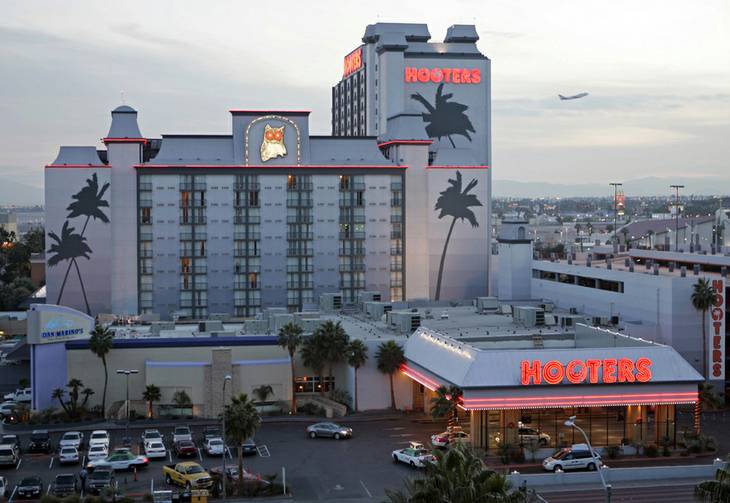Neither side is backing down in the Hooters Las Vegas casino resort bankruptcy case, with Hooters’ main creditor asserting again Wednesday it should be allowed to foreclose on and sell the property.
Since Hooters filed for bankruptcy protection on Aug. 1 to block a foreclosure planned by Canpartners Realty Holding Co. IV, it’s been fending off efforts by Canpartners to quickly close the bankruptcy case so Canpartners can foreclose.
For instance, Canpartners early on unsuccessfully tried to prevent Hooters from spending money to market itself to potential investors.
Canpartners, a unit of investment company Canyon Capital Realty Advisors of Los Angeles, says Hooters is so far underwater on its mortgage that its reorganization efforts are hopeless and a waste of time and money.
Canpartners holds more than 97 percent of the 696-room property’s $181 million in face value debt and says the Tropicana Avenue resort is worth only about $75 million.
But Hooters and its attorneys are portraying Canpartners as an opportunistic debt investor, saying it picked up $127.5 million of the debt for just 22 cents on the dollar.
"Debtor’s largest creditor, Canpartners, has engaged in abusive tactics to derail these Chapter 11 cases,’’ Hooters’ attorneys at the Las Vegas law firm Gordon Silver charged in an Oct. 28 request to Las Vegas Bankruptcy Judge Bruce Markell that Hooters’ exclusive period to propose a plan of reorganization be extended past its Nov. 29 deadline.
By extending the exclusivity period, Hooters would buy more time to find investors and maintain control of the bankruptcy case as Canpartners couldn’t propose its own reorganization plan until the next proposed deadline of Jan. 28.
Canpartners' attorneys fired back on Wednesday, asking Markell to terminate Hooters’ exclusivity period on Nov. 29 so Canpartners can propose its own plan.
"This is the `textbook’ case for terminating the exclusive periods for a variety of reasons,’’ Canpartners said in its motion, charging the existing Hooters investors are looking for more investors as opposed to marketing the property for sale solely so they can avoid personal tax liabilities.
"Despite their fiduciary obligations to maximize recoveries for creditors, debtors appear to have no interest in considering a sale, despite that a sale of the property is the best (and only) way to maximize value (for the bankruptcy estate),’’ Canpartners said in its filing.
Canpartners also complained that Hooters has failed to make interest payments on its secured notes since October 2008, it’s now some $35.5 million behind on those payments and this amount is growing at the rate of $947,000 per month.
The Canpartners plan calls for Hooters assets to be sold through a foreclosure or auction process in which Canpartners would be able to credit bid.
With a credit bid, Canpartners could gain ownership of Hooters by exchanging its debt for equity and then hold on to the property until it finds a buyer at a price it’s willing to sell the resort for.
Canpartners said its proposed plan would result in immediate payments in full of about $1 million to unsecured creditors, who otherwise face "little to no recovery’’ under any debt-elimination plan Hooters could propose.
"Debtors simply don’t need any more time. Debtors began their restructuring efforts more than three years ago. They have already spent more than $3 million on those restructuring efforts. These efforts have been abject failures and have eroded value to creditors. Debtors neither need nor deserve additional time to continue down this same path,’’ Canpartners attorneys at the Los Angeles law firm Loeb & Loeb LLP said in their filing.
Canpartners submitted with its filing an affidavit from John Knott, a well-known hotel-casino broker at CB Richard Ellis.
He said Hooters had engaged CB Richard Ellis to sell the property in 2009 but the desired price was "unrealistic’’ and that current efforts by Hooters contractor Innovation Capital LLC to find investors are "unlikely to succeed’’ because the Hooters investors insist on keeping an ownership stake to avoid tax problems.
"It is very unlikely that debtors will be able to find a funding partner that will enable them to complete the $40-$50 million in renovations necessary to reposition the property, service the debtor’s debt and otherwise restructure the debtors’ affairs,’’ Knott said in his declaration. "It is even more unlikely that this funding partner would permit existing equity (holders) to retain any equity in the debtors going forward, particularly if existing equity (holders) were unwilling to contribute any of their own capital.
"Without a court-mandated reduction in the principal amount of the outstanding debt, the debtor has no chance to bring capital to the property as the principal amount of the debt clearly exceeds the market value of the asset,’’ Knott said in his declaration.
Hooters, however, has said Innovation Capital has recently sent information to more than 200 potential investors and as of last week, 22 potential investors had signed confidentiality agreements and received a presentation on the investment opportunity.
Markell plans a Nov. 29 hearing on the competing requests on whether to extend or terminate Hooters’ exclusivity period.
